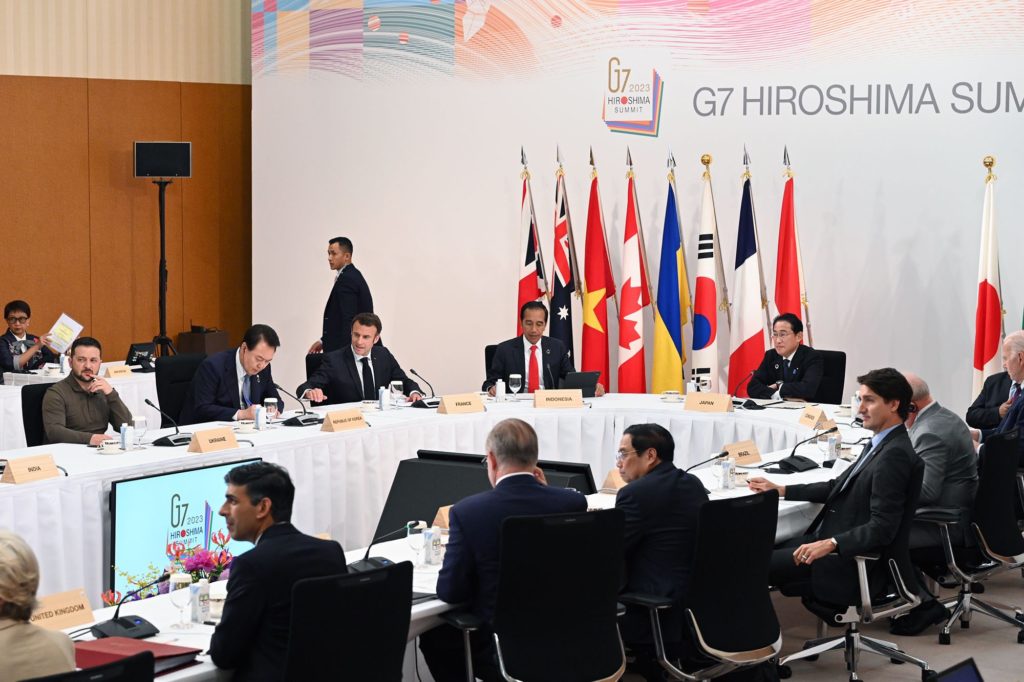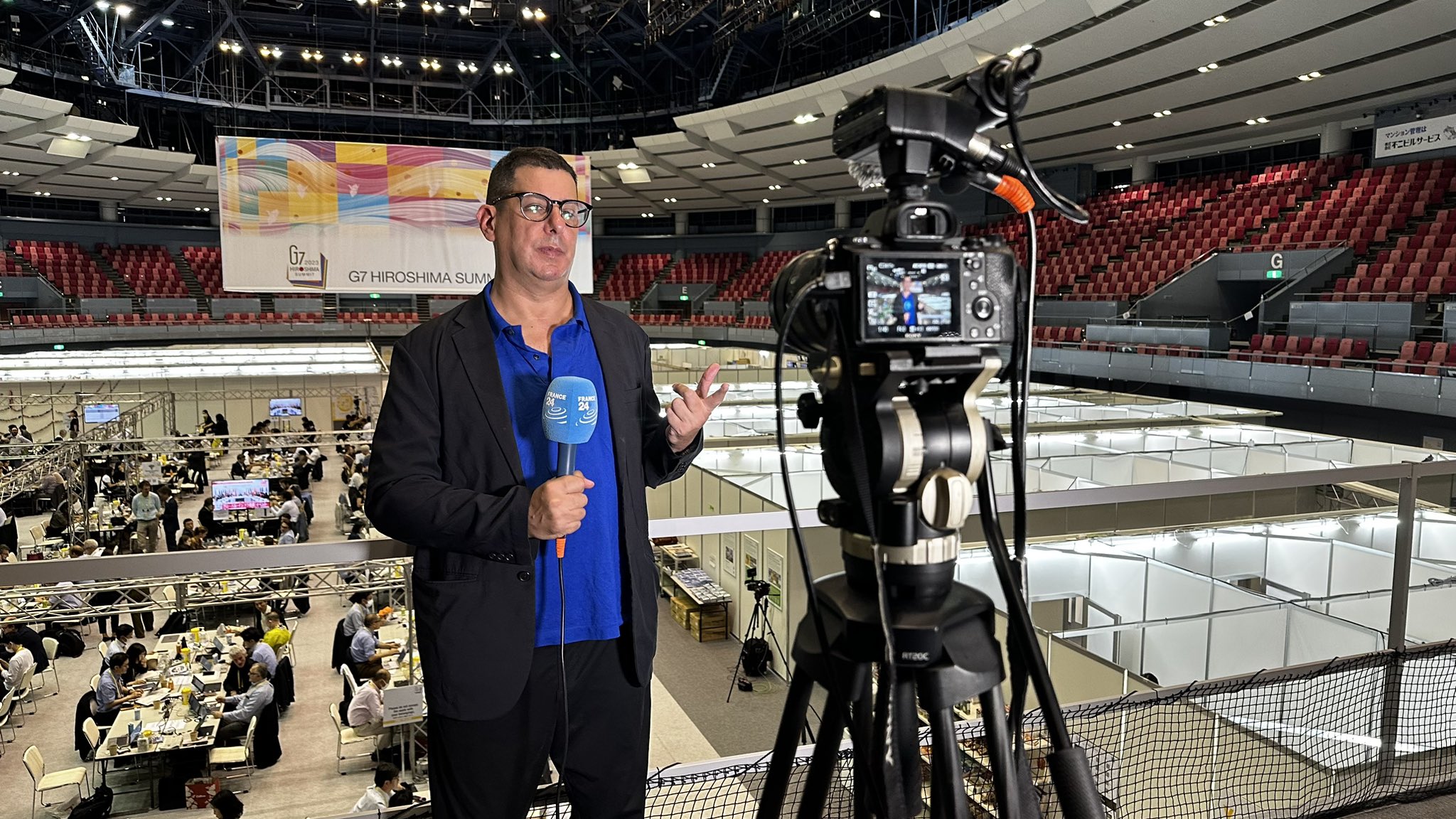by Henry Rogers and Jake Adelstein
The 2023 Hiroshima G7 summit ended yesterday against the backdrop of the first-ever city to be destroyed by an atomic bomb. The summit covered a wide array of ideas and policy initiatives from the war in Ukraine to the vulnerability of the global south.
The member nations reaffirmed their support for democratic Ukraine in the war with Russia. President Biden promised to allow Ukraine to have fourth-generation fighter jets such as the F-16 and the other G7 nations promised to help. Ukraine’s European allies have announced the formation of a coalition to donate these planes. As to who will be donating and how many is yet to be announced, but who will be training these pilots has been publicly decided. Denmark and the United States have already committed to teaching Ukrainian pilots.
Severe sanctions, such as banning Russian diamond sales, were agreed upon to isolate Russia further and hold the nation’s government accountable for the war. The G7 acknowledged that Russia has been utilizing sanction dodging techniques partially nullifying previous sanctions. They urged countries not to participate in these techniques and have created targeted sanctions to counter them.
Strong protests were lodged against economic coercion by China and support for Taiwan was reaffirmed. The G7 created a China communique with leaders saying they will not attempt to block China’s development and do not want to de-couple from China. However, the member nations agreed on a strategy of de-risking. This approach will come in the form of bolstering non-Chinese supply chains and working to develop resources and technology without reliance on China.
After a surprise in-person visit by Ukrainian President Volodymyr Zelensky, Biden pledged almost 400 million dollars worth of security assistance. This includes new technology, vehicles, and ammunition. All on top of the new policy allowing fourth-generation fighters to be donated to Ukraine.
Zelensky’s surprise in-person visit allowed him to meet with countries that have stayed neutral in the war, such as India and Brazil. Zelensky told the press that he had a very productive meeting with Prime Minister Narendra Modi of India. The Ukrainian prime minister explained that while he was not able to meet with Brazilian President Lula, he was able to speak to all of the attending countries and get his message across.
The summit was not just significant politically but symbolically as well. This was the first time many of the member nations ever had a leader visit the Hiroshima Peace Memorial Park. Before the summit began Kishida brought them together at the site, and they paid their respects to those killed in the world’s first atomic bombing.
It was a reminder of the terrible cost of nuclear war at a time when Russia is threatening to use tactical nuclear weapons. And while Russian troops are using a seized nuclear power plant in Ukraine as a shield. While at the same time, in the east nuclear pressure is heightened by the Chinese and North Koreans. Each building up and modernizing their nuclear arsenals.
Kishida ended his summary speech on a hopeful note.
“There is a difference between dreaming and ideals. Ideals are within our reach. All of us are now citizens of Hiroshima, we should take practical steps, step by step, toward the ideal of our children, grandchildren, and descendants to live on a nuclear-weapon-free earth.”
Zelensky, ended his final speech today on a defiant note– one that also underlined the fears that Russia might play the nuclear card.
“I was very touched by the photo of the Hiroshima citizen who perished after the explosion and only his shadow remained on the ground. Russia wants us to be gone and wants our country to be a shadow like that. But that will never happen.”
What is the G7, and why is it in Hiroshima?
The Group of Seven, or G7 for short, is an international organization made up of the top seven economies in the world, excluding China and India. The G7 has no established office or leader, and the head of the organization rotates between the member states. The leader of each of these states is that countries representative to the G7 and the head of the delegation that travels to the yearly summit. The yearly summit is held by whichever member is the current chairman. The members who attend are the United States, the United Kingdom, France, Italy, Germany, Japan, and Canada.
On top of these members, the European Union is a non-enumerated member and has participated in summits since 1977. The G7 was first started in 1973 with only four members under the name the Liberty Group, then adding Japan and morphing to the group of five later that year. The group quickly grew to seven nations adding Italy in 1975 and Canada in 1976 as they were the next largest economies. The group did not and has not added a member since Russia joined the group in 1998 growing it to the group of eight. This group has shrunk back into the group of seven as Russia was expelled post its 2014 invasion of Crimea.
While there are only seven member states and one non-enumerated member there are many other nations in attendance. The Members often invite nations from around the world. This year, Japan invited South Korea and Australia to the Summit this year as the members discussed Indo-pacific security, as well as India and Brazil for the discussion of aiding the global south.
The G7 was started as a purely economic forum, but as it is made up of some of the most influential nations in the world, it has morphed into passing more broad policy initiatives. This year at the Hiroshima Summit was no exception. The summit took place in Hiroshima because Fumio Kishida, Japan’s prime minister, is the current chairman of the G7 and a resident of Hiroshima. But he did not choose the once-decimated Japanese city because it was his childhood home. He chose Hiroshima because it is the first city ever to be decimated by a nuclear weapon. He felt that it was the best location to discuss one of the main aspects of this year’s summit: nuclear disarmament and non-proliferation.
Kishida’s closing comments

The Hiroshima Summit was very important for Prime Minster Kishida, and in his closing speech, he covered why.
He expressed his resolve to pursue the idea of a nuclear-free world. The prime minister declared, “We are all citizens of Hiroshima,” calling for an end to nuclear weapons.
And in an apparent jab at Russia and its nuclear threats over the invasion of Ukraine, Kishida said: “The use and the threat of using nuclear weapons to change the status quo by force are unacceptable.” And “As the G7, we will make efforts to bring about a just and lasting peace to Ukraine as soon as possible.”
The Prime Minister exclaimed, “We will aim for the complete denuclearization of North Korea,” as the small authoritarian nation is now and has been a direct threat to Japan with its young nuclear program.
Furthermore, as the novel coronavirus subsides, he confirmed solidarity to prepare for the next infectious disease crisis. He announced his intention to contribute a total of 7.5 billion dollars to the public and private sectors of Japan in the field of global health.
He expressed his intention to promote efforts to strengthen the economic resilience and economic security of the international community. He also discussed the inclusion of invited members and how the G7 was going to attempt to include them and the global south more. This inclusion is in part because of the vulnerability of the global south and its underestimated importance to global policy.
Kishida ended his speech by stressing the importance of upholding international law.
